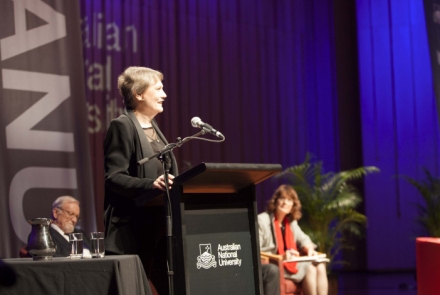
Former NZ Prime Minister Helen Clark delivers the Crawford Oration.
Helen Clark delivers Crawford Oration
Former New Zealand Prime Minister and high-ranking United Nations official Helen Clark has delivered the Crawford Oration at ANU, officially starting the 2017 Crawford Australian Leadership Forum.
Ms Clarke, who for eight years was the head of the UN Development Program, used the Oration to discuss the leadership the world needs to meet the 2030 Agenda for Sustainable Development and the new UN Sustainable Development Goals.
“It seeks to eradicate poverty in all its forms and to create a more peaceful, inclusive, and sustainable world,” Ms Clark said.
“That short description alone makes it clear that the global sustainable development agenda is a very large one.”
The full address is available here.
She said the Sustainable Development Goals cover a range of global agreements, including the Paris Climate Agreement, as well as agreements on risk reduction, development financing, humanitarian issues, refugee and migrant rights, and an urban agenda on housing.
“Taken together, these agendas call for transformation in the ways we think about and do development,” she said.
“First, there is a significant lift in ambition.
“The 2030 Agenda, is about ‘getting to zero’ over 15 years - including by eradicating poverty and hunger entirely, and by ending the epidemics of AIDS, tuberculosis, and malaria.”
She said meeting the goals would require the mobilisation of unprecedented levels of finance.
“All sources will need to be drawn on - as the Addis Ababa Action Agenda points out, public and private, domestic and international, and developmental and environmental finance are all needed,” she said.
She also pointed to the need to tackle unemployment and the disruptive influence of technology.
Ms Clark said leadership was needed at every level in order to meet the Sustainable Development Goals.
“Leadership is required at every level - global, regional, national, local, and individual. It must encompass the public and private sectors, NGOs, and civil society,” she said.
“The role of national governments must be complemented by those of local governments and other stakeholders.
“At the global level, the multilateral system must be fit for purpose in order to lead on the global agendas. “
She said the challenges to achieving sustainable development include entrenched poverty and inequalities, protracted conflicts and forced displacement, economic and political volatility, a major jobs deficit, an urgent need to adapt to demographic trends.
She also said some countries and communities faced exposure to severe natural disasters - including those exacerbated by climate change.
“These challenges call for bold approaches to building a more just, peaceful, and sustainable world,” she said.
“Thanks to the far reaching global agreements concluded in the past two years, there are good roadmaps for inclusive and sustainable development.
“The alternative to following them is to have a world characterised by even more turmoil and instability than the one we know today.
“That is avoidable - or at the least can be mitigated - with resolute action. That is why it is imperative for leaders to build support for the steps required to meet the sustainable development challenge.”
Updated: 2 July 2024/Responsible Officer: Crawford Engagement/Page Contact: CAP Web Team












